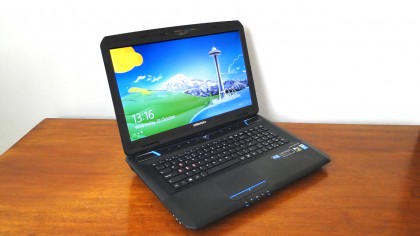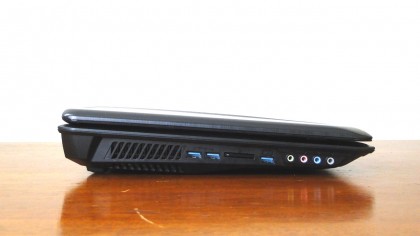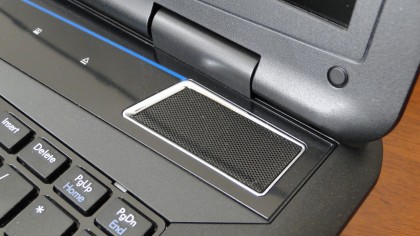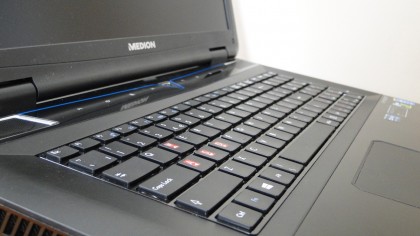TechRadar Verdict
Good gaming performance and decent screen, but lack of solid-state storage is a major flaw.
Pros
- +
Good all-round gaming grunt
- +
Great CPU performance
- +
Beefy sound system
- +
Decent screen
Cons
- -
Atrocious hard drive performance
- -
Poorly configured dual graphics
- -
Noisy cooling
Why you can trust TechRadar
Super slim laptops and ultrabooks are what all the marketing men at PC manufacturers love. And they're darn desirable things. But they have limitations and one of the most obvious is the ability to game.
That's where a 17-inch beast like the Medion Erazer X7825 (MD 98414) comes in. On paper, it's got the gaming chops to handle almost anything you can throw at it.
That means a powerful quad-core Intel processor and a beefy discrete graphics chip from Nvidia, namely the GeForce GTX 770M. Of course, there's more to being a great gaming laptop than simply speedy silicon.
You'll need a decent screen, for starters. The Medion's weighs in at a monster 17.3 inches and full 1080p in terms of resolution. There's also a high-power sound system including a subwoofer, a Blu-ray drive and 750GB of storage for games, videos and more.
Of course, a gaming laptop needs to be half decent at being just, well, a laptop, too. In an ideal world, you'd have enough battery life for genuine mains-free usability. A few movies on a flight, that sort of thing.
You also want to cover all the bases in terms of networking, connectivity, card reading and all that jazz. So let's see how the Medion Erazer X7825 stacks up.

Performance
Benchmarks
Cinebench R11.5: 6.71pts
x264 4.0 HD video encode: 35fps
3D Mark Firestrike: 3,043pts
Heaven 3D tesselation benchmark: 25fps
Metro Last Light: 14fps
GRID 2: 38fps
Sign up for breaking news, reviews, opinion, top tech deals, and more.
Let's kick off with the CPU side of things. Medion has gone for an Intel Core i7-4700MQ. It's a 2.4GHz nominal, 3.4GHz Turbo quad-core chip. And it's really all the CPU you're ever going to need for gaming.
And that despite the fact that this chassis appears to have a few issues keeping it cool. During heavy CPU loads, the cooling system makes one hell of a clatter.
What's more, maintain a sustained heavy CPU load and you find the clocks dropping off a little. Set something heavily threaded running and it will initially zip along at 3.2GHz. But within a minute or so, the clocks drop and fluctuate between 2.9GHz and 3GHz.

However, the reality is that this is still one hell of a beefy CPU for a portable system. On the graphics side we're talking Nvidia GeForce GTX 770M with 3GB of memory.
As ever with mobile GPUs, the branding is misleading. This is not a 1,536-shader graphics solution based on the GK104 chip, as is the case for the desktop GTX 770. Instead, it sports 960 shaders courtesy of GK106.
That's no necessarily a major issue. It would just help anyone choosing a laptop if the branding was more consistent. Whatever, the 770M is a decent gaming chip. Middle-ranking games, in terms of graphical fidelity, like GRID 2 bowl along at a decent speed at the display's native 1,920 by 1,080 pixel resolution, even with the image quality set to maximum.

Fire something serious demanding up, for instance Metro Last Light, and you'll have to makes a few compromises on the IQ settings to get smooth frame rates.
But what of the quality of the screen itself? We've seen worse, is probably the best way to put it. We like the matte screen coating. Glossy coatings add little to the experience other than annoying reflections.
Likewise, the basic panel attributes, including viewing angles, colour saturation and fidelity, contrast and all that jazz are decent. OK, it's a good TN panel rather a really exceptional IPS display. But we have no major complaints re display quality.

The sound levels from the sub-woofer boosted audio system and strong, too, even if the actual quality is a little muddy and mediocre. Few laptops offers truly satisfying sound, so this is hardly a shock.
If all that sounds pretty promising, the Medion Erazer does have at least one major weakness. And that's storage performance. We were surprised and frankly a little concerned to discover a 750GB magnetic drive as its sole source of built-in storage.
And our worries proved well founded. Storage performance is atrocious. You feel it installing games. You feel it when Windows applies updates, which take aeons to install. You even feel when simply firing up fairly undemanding apps.
In the past, this was unavoidable. Fast hard drives couldn't fit into laptop systems. But that all changed years ago when SSDs arrived and allowed laptops to match desktops for storage performance. Put simply, this laptop is crying out for a solid-state drive.

As for battery life, three hours and 13 minutes playing 720p video with the wireless disabled and the screen at one-third brightness isn't as catastrophic as some gaming laptops. But it still means you're essentially limited to one movie on the move.
One final issue worthy of note involves the graphics setup. The Intel CPU provides a low-power graphics core, which offers a low-power option when running on batteries.
That's great, but by default, the Medion is set to run all 3D applications on the Intel core, even when plugged into the mains. That's not great and it will cause some buyers a great deal of confusion. Because games will still run on the integrated Intel core. They just run very slowly.
Technology and cars. Increasingly the twain shall meet. Which is handy, because Jeremy (Twitter) is addicted to both. Long-time tech journalist, former editor of iCar magazine and incumbent car guru for T3 magazine, Jeremy reckons in-car technology is about to go thermonuclear. No, not exploding cars. That would be silly. And dangerous. But rather an explosive period of unprecedented innovation. Enjoy the ride.
